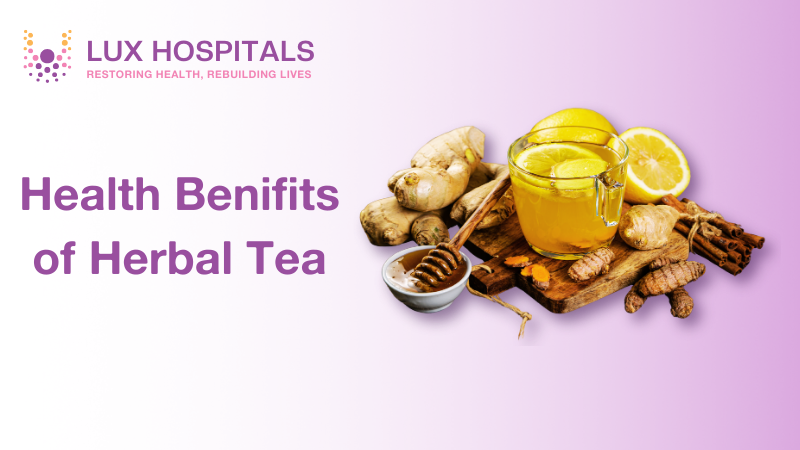10 Herbal Teas to Boost Health and Warmth This Winter

As winter blankets the world in a cool embrace,Wrapping your hands around a steaming cup of herbal tea is the most relaxing thing you can do. Herbal teas have various benefits than just warm you up, though. They can help make you feel better, give you vital nutrients, and treat common wintertime illnesses.
Let’s dive into the world of 10 herbal teas that are perfect for keeping you healthy and cozy during the colder months.
What Are Herbal Teas?
Herbal teas are beverages made by infusing various herbs, spices, fruits, and flowers in hot water. Unlike traditional teas derived from the Camellia sinensis plant, herbal teas are naturally caffeine-free, making them a great choice for all ages and any time of the day. With countless blends available, they offer unique flavours and an array of health benefits.
Benefits of Herbal Teas in Winter
Herbal teas aren’t just delicious; they’re packed with properties that:
- Boost Immunity: Many herbal teas contain antioxidants and vitamins that strengthen your immune system.
- Soothe the Body: They can help alleviate common winter issues like sore throats, congestion, and digestive problems.
- Provide Warmth and Comfort: Sipping a warm cup of herbal teas provides physical and emotional warmth, reducing stress and promoting relaxation.
10 Herbal Teas to Try This Winter
1. Chamomile Tea
Chamomile tea is renowned for its calming effects. It’s an excellent choice for winding down after a long, cold day. The anti-inflammatory and antioxidant properties in chamomile help relieve cold symptoms and promote restful sleep.
Benefits:
- Reduces anxiety and stress.
- Supports better sleep.
- Soothes upset stomachs and indigestion.
2. Ginger Tea
Ginger tea is a spicy and invigorating option to combat the chill. Known for its anti-inflammatory and immune-boosting qualities, it’s particularly effective against nausea and winter colds.
Benefits:
- Eases digestive discomfort.
- Boosts circulation to keep you warm.
- Reduces cold and flu symptoms.
3. Peppermint Tea
Peppermint tea is a refreshing option with cooling properties that surprisingly warm the body. It’s perfect for relieving headaches and clearing sinuses.
Benefits:
- Aids digestion.
- Relieves headaches and migraines.
- Clears nasal congestion.
4. Echinacea Tea
This herbal tea is a winter favourite for preventing and managing colds. Echinacea’s immune-boosting properties make it a must-have during the flu season.
Benefits:
- Enhances immune function.
- Reduces the severity and duration of colds.
- Fights infections naturally.
5. Hibiscus Tea
Known for its vibrant red hue and tart flavor, hibiscus tea is rich in vitamin C, making it a powerhouse for winter immunity.
Benefits:
- Lowers blood pressure.
- Boosts immune health.
- Provides antioxidants to combat free radicals.
6. Rooibos Tea
Originating from South Africa, rooibos tea is naturally sweet and caffeine-free. It’s packed with antioxidants and offers a soothing, nutty flavor.
Benefits:
- Supports heart health.
- Improves skin conditions like eczema.
- Provides relaxation without caffeine.
7. Lemon Balm Tea
Lemon balm tea has a mild citrus flavor and calming properties, making it ideal for reducing winter stress and anxiety.
Benefits:
- Promotes relaxation and mental clarity.
- Supports digestive health.
- Helps with mild sleep disorders.
8. Turmeric Tea
Turmeric tea, often called “golden milk tea,” is a powerful anti-inflammatory beverage. Its warming spice is perfect for battling winter’s chill.
Benefits:
- Fights inflammation in the body.
- Supports joint health.
- Boosts the immune system.
9. Cinnamon Tea
Cinnamon tea’s naturally sweet and spicy flavor makes it a winter classic. It’s great for regulating blood sugar levels and keeping you warm.
Benefits:
- Stabilizes blood sugar levels.
- Improves circulation.
- Reduces inflammation.
10. Licorice Root Tea
Licorice root tea is a soothing option for sore throats and respiratory issues. Its sweet taste also makes it a delightful treat.
Benefits:
- Soothes sore throats and coughs.
- Supports adrenal health.
- Acts as a mild laxative to relieve constipation.
Tips for Enjoying Herbal Teas This Winter
- Experiment with Blends: Combine different herbs to create unique flavors and benefits.
- Add Natural Sweeteners: Enhance your tea with honey or maple syrup for added health benefits.
- Stay Consistent: Make herbal teas a part of your daily winter routine to maximize their benefits.
Conclusion
Herbal teas are a fantastic way to stay warm and healthy during the winter months. With their diverse flavors and health benefits, they’re more than just a cozy drink – they’re a natural remedy for common winter woes. Whether you prefer the calming effects of chamomile, the immune-boosting power of echinacea, or the spicy warmth of ginger, there’s a tea for everyone. Try these 10 herbal teas this season, and let them keep you feeling your best all winter long.
Frequently Asked Questions
Herbal teas are beverages made by infusing herbs, spices, flowers, or fruits in hot water, without traditional tea leaves. Popular examples include chamomile, peppermint, ginger, and hibiscus teas.
Drinking herbal tea daily can aid hydration and offer health benefits like better digestion and sleep. However, choose teas that suit your health needs to avoid potential side effects.
Yes, herbal tea can have side effects, especially if consumed in excess or if you’re sensitive to certain herbs. Some herbs may interact with medications or cause allergic reactions, digestive issues, or other symptoms.
The best time to drink herbal tea depends on the type. For relaxation and better sleep, herbal teas like chamomile are ideal before bed. Peppermint or ginger tea can be refreshing and help digestion, making them great after meals.
Yes, you can drink herbal tea on an empty stomach, but some herbal teas, like peppermint or ginger, may cause mild irritation for sensitive individuals. It’s best to start with mild teas like chamomile and observe how your body reacts.





















